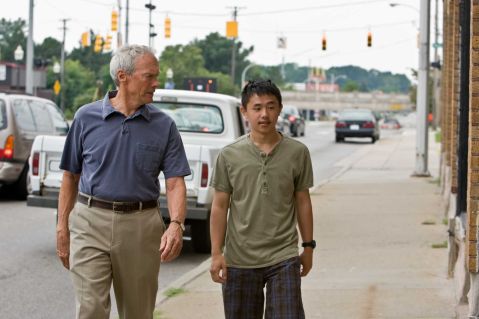Gran Torino
Clint Eastwood, Bee Vang, and Christopher Carley star in a film written by Nick Schenk and directed by Eastwood.

One of the most immediate and also guilty pleasures of Clint Eastwood’s gritty, sweet, and oddly grand Gran Torino is watching the man himself, delivering the kind of signature performance as only he could – even at age 78. Is there another actor on the scene who could spew racial epithets, politically incorrect one-liners, and aim guns (real and imaginary) to such great heights of entertainment and socio-dramatic insight? Probably not.
As Walt Kowalski, a gruff, gravel-voiced retired autoworker and Korean War vet, Eastwood plays a man at war with himself and his downwardly mobile Detroit neighborhood, particularly the Hmong family next door. He sucks on Pabst Blue Ribbon, reserves most of his love for his trusty dog, dodges the concern of a young local priest (Christopher Carley), and generally says much with few words. After the death of his wife, the Hmong family draws him into a cycle of vengeance and urban volatility with a local gang, then eventually a compassionate and loving relationship with the family. By interacting with his literal next-door neighbors, Walt gets a lesson in cultural exchange, and a confrontation with his demons.
Even apart from the worthy themes of racial tolerance and inter-generational warmth in the film, it’s a pure thrill to watch Eastwood in a classic new role. A key scene, which may well end up in the annals of “Clint-isms,” finds him breaking up a brawl with his rifle and the simple phrase “get off my lawn,” but stated with Dirty Harry-esque degree of brute menace implying he means business. In another memorable scene, in which his son and daughter-in-law patiently try to talk him into moving to a retirement home, Eastwood says nothing at all, but his face in close-up is a model of seething rage ready to erupt.
By now, it seems everybody loves Eastwood, as actor, mythic figure, and filmmaker whose track record in the past decade has been stunning. In many of his roles, including his latest, Eastwood has embodied the tough all-American loner and man of few words; the dispenser of justice and well-placed mean glances, but a softie at the core.
And in the late phase of his career, Eastwood the artist has soared in a way not quite matched by any other American filmmaker. From 2003’s Mystic River on, Eastwood has been on an inspired roll. As a filmic whole, Gran Torino is not one of his greatest films, marred partly by uneven performances (a forgivable problem, in that Eastwood admirably cast non-professional Hmongs with no previous film experience). But Eastwood’s anchoring presence in the lead is so damn magnetic, he raises the heat of the thing, right down to the grand, sacrificial ritual finale.
As if to cap off the operatic nature of the project, we hear Eastwood’s own modest singing voice as the end credits roll, on the lovely theme song which Eastwood – a passionate music fan – also co-wrote. This is a guy who can quickly get people off his lawn, and slowly, steadily win our hearts.



